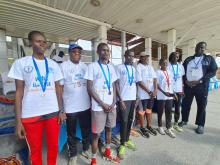On World Health Day, World Health Organization turns 75
Juba – on World Health Day, the World Health Organization (WHO) celebrates its 75th anniversary. In 1948, countries of the world came together and founded WHO to promote health, keep the world safe and serve the vulnerable – so everyone, everywhere can attain the highest level of health and well-being.
Working with 194 Member States across six regions and on the ground in more than 150 offices, WHO envisions a world where Health for All is realized. The right to health is a basic human right that promotes health and wellbeing, dignity and a good quality of life for everyone, despite who they are, where they live or what they do.
As part of the commemoration, the Ministry of Health in collaboration with WHO and the South Sudan Athletics Federation hosted ‘Walk the Talk’ to promote health and prevent noncommunicable diseases.
“Physical health is free and contributes to the mitigation of diseases. Physical activity nourishes your physical and mental health and contributes to the peace and stability of the country”, said Hon. Yolanda Awel Deng, Minister of Health of South Sudan. “Physical activity prevents diseases. By going outside and running you will lead an active lifestyle which prolongs your life”, said Hon. Deng.
On behalf of the Government of South Sudan, I appreciate WHO, partners and everybody that came out this morning to take part in this important event. Hon. Deng urged everybody to get out and exercise, said Hon. Deng.
With WHO’s support, South Sudan eradicated wild poliovirus. The country scaled up the delivery of maternal and child health services, and improved access to quality essential health services and essential medicines and diagnostics. Inpatient management of severe acute malnutrition with medical complications improved. National Blood Transfusion Services expanded, voluntary non-remunerated blood donations increased, health workforce improved.
In his remarks, Peter Van der Auweraert, the Acting Deputy Special Representative of the Secretary-General, Resident and Humanitarian Coordinator said, “A lot of progress has been made to strengthen the health system in South Sudan. We will continue advocating for more domestic investment and resource allocation to the health sector”.
He reiterated the UN’s support to rebuild the country’s health systems and to accelerate efforts towards the attainment of Universal Health Coverage.
The emergency preparedness investment supported the health system strengthening. The health emergencies preparedness and response activities became very important to respond to the COVID-19 pandemic and combatting infectious diseases.
“WHO’s 75th anniversary is an opportunity for us to stop and reflect on the remarkable achievements in advancing the health and wellbeing of the people of South Sudan,” says Dr Fabian Ndenzako, WHO Representative a.i. for South Sudan. “It is also the chance for us to come together around our common goal and renew our commitment to harmonized and contextualized health service delivery without financial barriers for greater health impact to the people of South Sudan.”
At the heart of #healthforall is the attainment of Universal Health Coverage, where people can have access to affordable, equitable, good quality and sustainable health care. National health strategies should therefore position primary health care as the entry point into a health system which not only treats ill health, but also prevents illness and promotes good health.
To advance Universal Health Coverage, WHO and partners supported the Ministry of Health to validate and launch the Pharmacy Policy and Strategy; developed Health Sector Strategic Plan 2023-2027 and the Minimum Standards for Reproductive Maternal Newborn Child Adolescent Health (RMNCAH) and HIV/AIDS integration which will contribute to the delivery of integrated RMNCAH and HIV services at the facility level as well as Maternal Perinatal Death Surveillance Implementation Guidelines to guide MPDSR implementation and institutionalization.
The country is also facing unprecedented health emergencies, driven by conflict, displacement, and the effects of climate change.
The country has been experiencing devastating floods for four consecutive years. Half of the country’s counties are affected. The floods have been so severe that the water did not fully recede in the intervening dry season in places, leaving parts of the country continuously submerged.
The floods have also destroyed precious health and nutrition centres. Forty-five health facilities – reaching 675 000 people – have been damaged by the floods in 2022. Those that are functioning, are facing a shortage of essential medicines and supplies.
Over 110 nutrition facilities have been submerged, cut-off from the world, or have sustained significant structural damage. This has meant that reaching those in need is now harder than ever.
In 2022, over 1 million people have been affected by severe floods and over 180 000 people have been forced to leave their homes. These climate events are driving outbreaks of measles, cholera and malaria.
The COVID-19 pandemic has rolled back the hard-won gains made in routine immunization against vaccine-preventable childhood diseases. In the past three years it is estimated that 21 million children have not received a single vaccine dose. In 2021, the world saw the worst continued decline in routine immunization in 30 years, and WHO estimates that immunization coverage will not return to 2019 levels until 2027 without immediate action to catch up and get back to normal.
The country’s routine immunization and annualized coverage of Penta 3 remained at 85% in 2022. This indicator has improved in the last two years, with at least seven out of ten states meeting the Penta 3 target of 80% in 2022. In 2022/23 WHO and partners had supported reactive campaigns in response to the Measles campaign with over 937,123 persons immunized.
